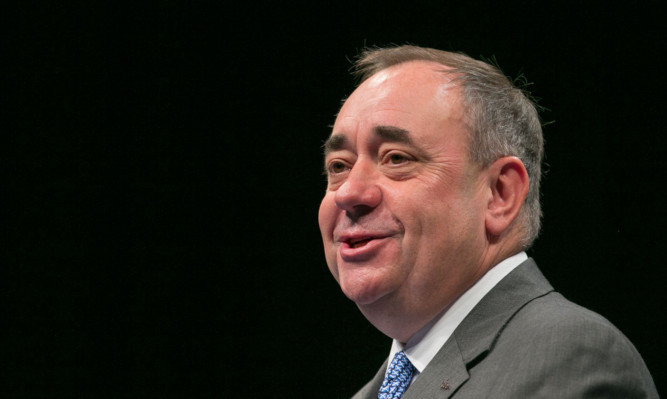Purdah does not stop the function of impartial government in general election campaigns and it should not be suspended in the run up to the EU referendum, Alex Salmond has said as a Tory rebellion loomed in the Commons.
The former SNP leader endorsed a rebel amendment to the European Union Referendum Bill which would impose restrictions on the Government and civil service in the 28 days before the poll.
The Bill’s original drafting suspends the normal rules, contained in the Political Parties, Elections and Referendums Act 2000, because the Government has argued it would interfere with the day to day government business which involves the EU.
Tory backbenchers, led by Sir Bill Cash alongside prominent former cabinet ministers such as Owen Paterson, are poised for a crunch Commons vote on the issue later today insisting the Government and EU Commission must not be allowed to bombard voters with taxpayer funded propaganda in the final days.
The prospect of rebellion has already seen the Government back down on questions about the date of the referendum, meaning the Bill will now explicitly rule out the poll taking place on the same day as other elections.
Speaking before the debate, Chancellor George Osborne promised the Government would “come forward with reassurances” to make sure “there isn’t an unfair referendum”. Europe Minister David Lidington has also written to MPs to try and head off the rebellion.
But moving his own committee stage amendments, Mr Salmond said: “I hear from the Government they can’t really function in a purdah period, that government won’t be able to make representations to European Council, that it will be so impossible over the 28 day period.
“But that’s what happens in each and every general election we have had. I didn’t notice recently, in April and May, that the administration of this country ground to a halt – a lot of people thought it was better not having a fully activated government in the campaign period.
“If it can be done in each and every general election, then it can be done in this referendum campaign.”
Mr Salmond said the events in last year’s referendum demonstrated ministerial promises not to officially interfere would ring hollow.
He told the Commons: “Let’s take a scenario, the possibility, that at some point in the course of the referendum campaign next year or the year after that the No side moves to the front of that referendum.
“In order to try and get the result the Prime Minister Cameron would wish of that time, that he wants a Yes result, he needs a last minute initiative. And with no rules or restrictions saying new political initiatives should not be made at a government level in the last 28 days of the campaign, what would be to stop such a Prime Minister at that time doing a tour of European capitals… suspending question time in the national parliaments and flying as one here to London to announce a new commitment, a new undertaking, a new pledge – a new vow?
“To say only if you vote Yes, we will secure these new terms we didn’t mention before the campaign started but now we undertake as good Europeans, and let’s just say that vow was influential in persuading people, or enough people, to switch their vote. And let’s just say that after the dust was settled, all of these European leaders did not really want to go forward with the vow they had made?
“How would people in the United Kingdom then view that sort of situation? Wouldn’t it therefore be better in terms of what is on the face of this Bill that explicitly, in the last 28 days, of the campaign period allows people to make a judgment on the arguments that have been properly presented without the use of the government machine to bias the result one way or another.”
